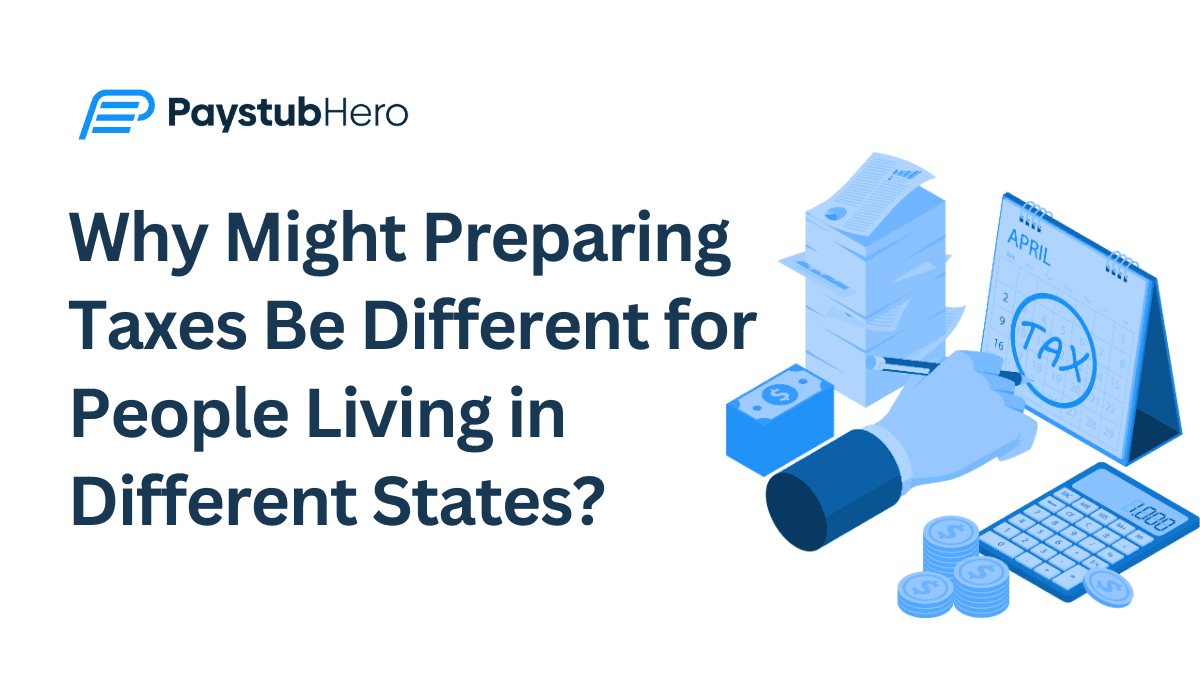One quick reason taxes can vary for people in different states is that a single state has its own tax laws. Some states have income taxes, others don’t, and a few even offer unique deductions or credits.
This means that where you live greatly affects how you prepare your taxes.
This article will explain how different states handle taxes and why that matters when filing your return.
Getting Ready for Tax Season: What You Need to Know
Tax season is upon us now, and this is pretty much the right time to get organized. Whether you’re a seasoned expert at filing or a total newbie, knowing what to expect makes things a bit easier.
So, let’s go through what to prepare for tax season.
Understanding the Process
The first step in preparing for taxes is gathering your documents. You need to collect everything related to your income and expenses. Once you’re all set, you can either file your taxes yourself or get help from a tax pro.
Documents You’ll Need
Start with your W-2 forms, which show your earnings and the taxes your employer withheld. If you’re self-employed or earned other income, you might have 1099 forms to include.
In addition to income documents, gather any receipts for deductions. This might include:
➡ Medical expenses
➡ Charitable donations
➡ Home office costs
➡ Education expenses
It’s also helpful to keep your last year’s tax return nearby. It can remind you of what you filed last year and help you spot any deductions you might still qualify for.
Who Should File?
You might wonder, “Who needs to file a tax return?” Generally, if your income is above a certain amount, you have to file. This amount changes based on your filing status (single, married, etc.) and age.
However, even if your income is below that amount, filing might still be a good idea. It can help you claim refunds or credits, like the Earned Income Tax Credit.
It’s important to note that the whole tax filing process above can differ based on where you live. Different states have unique tax laws and requirements, which can change how you prepare your taxes.
We will talk about some of the reasons below.
Why Might Preparing Taxes Be Different for People Living in Different States?
Now that we’ve gone over the basics of preparing for tax season, it’s important to understand that not everyone follows the same rules. If you live in different states, preparing and filing taxes can vary.
As briefly seen above, these differences often come down to state tax laws, residency rules, and specific deductions or credits available where you live.
Here are some key reasons why preparing taxes can differ depending on your state.
1. State Income Taxes
Not all states have income taxes. One of the biggest factors that make tax preparation different. For example, if you live in states like Florida, Texas, or Nevada, you don’t have to worry about paying state income tax.
On the other hand, states like California and New York do have income taxes, which means you’ll need to file both federal and state tax returns.
The rate of state income taxes can also vary. Some states have a flat tax rate, where everyone pays the same percentage, while others have a progressive tax rate, which increases with higher incomes.
This difference in rates can affect how much you owe and how much preparation is needed.
2. Deductions and Credits Vary by State
Another reason tax preparation might differ is the availability of deductions and credits.
While the federal government offers standard deductions and credits, many states have their own unique set of deductions. For example, some states offer tax credits for things like education expenses, green energy initiatives, or local taxes paid.
If you qualify for specific state deductions, you’ll need to make sure you have all the necessary documents to claim them.
This can mean keeping track of additional receipts or paperwork beyond what’s required for your federal taxes.
3. Residency Rules for State Taxes
If you moved during the year or lived in more than one state, things can get a little tricky. States have different rules about residency and how they tax income.
You might be considered a resident of one state but have earned income in another, meaning you may need to file multiple state tax returns. For example, if you worked in one state but lived in another, you may have to file in both states.
Some states have agreements to prevent double taxation, but it’s important to know what applies to your situation so you don’t end up paying more than you should.
4. Local Taxes on Top of State Taxes
In some places, local taxes add another layer of complexity.
Certain cities or counties may have their own taxes on top of what the state requires. Here is a good example.
Residents of New York City or Philadelphia have to pay city income taxes in addition to state and federal taxes. This means you’ll need to account for more paperwork and possible deductions specific to where you live.
Local taxes may also apply to property or sales, which can indirectly affect your overall tax preparation. This is especially if you’re claiming deductions related to those payments.
5. Different Filing Deadlines
While most people know about the federal tax filing deadline, states sometimes have their own deadlines for state tax returns. These deadlines can differ slightly, especially in states that don’t require income tax.
If you’re used to filing by the federal deadline, make sure to check if your state has a different due date so you don’t accidentally miss it.
Some states may also offer different extensions or penalties for late filing. This is something to keep in mind if you’re preparing taxes for multiple states.
6. Special State Tax Rules
Lastly, some states have special tax rules that don’t exist at the federal level.
For instance, certain states may tax specific types of income differently, like dividends or inheritance. Others may have unique rules around retirement income or capital gains.
Knowing these special rules can help you avoid surprises and be fully prepared. A perfect illustration is if you’re retiring in a state that taxes pensions but not Social Security. It could affect your tax liability in ways the federal rules don’t cover.
How to Adjust Your Tax Preparation if You’ve Recently Moved
We already know that moving between states can make tax season tricky. So, how can you adjust?
Here are some quick ways to stay prepared:
⦿ Note Down Key Dates: Keep track of when you moved in and out of each state, as some states may still tax income earned while you were a resident.
⦿ Check for Residency Rules: Look up tax guidelines specific to each state to determine what income you need to report.
⦿ Explore New State Credits: Some states have tax credits or exemptions for new residents, which can add to helpful savings.
Another way to stay organized is by using PaystubHero.
Make Tax Season Simple with PaystubHero!
No matter what state you’re filing from, PaystubHero has you covered. We provide essential documents like W-2s and paystubs to make tax preparation easy.
Our service is designed to help you gather everything you need to file accurately and efficiently, ensuring you don’t miss any details.
With PaystubHero, you’ll have the peace of mind that you’re ready for tax season, prepared to file confidently and stress-free.
FAQS
Here are common questions on why tax preparation may vary for people living in different states.
The tax system is complicated largely due to political and special interest influences, which lead to various exemptions and deductions, creating different tax rules for different people.
The U.S. has a highly detailed tax system to match its complex economy, and additional tax incentives make the process even more intricate.
The U.S. sits below the OECD average for tax revenue as a percentage of GDP, with a lower ratio than most other developed countries.
Taxes are important for funding essential public services, like infrastructure and law enforcement, which would be difficult for citizens to manage on their own.








